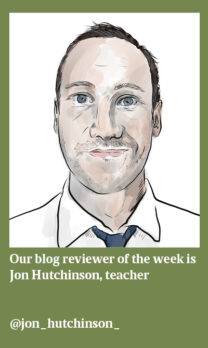Why I No Longer PEE
If it’s not too personal a question, I wanted to ask: do you PEE? I have to admit that I’ve PEEed at school before. I’m not proud of it, and deep down I knew it wasn’t right, but I did it anyway. Not everybody PEEs though, and Becky Wood argues convincingly here that the point-example-explanation paragraph structure does more harm than good: “firstly… it restricts and secondly because a lot of the time, the very students it is designed to support, just don’t understand what on earth it means.” Becky then goes on to offer an alternative, more flexible approach, which ensures that students actually engage in the text, answering what, how and why an author is doing. The blog is peppered with example answers, deconstructing this new approach and presenting a very powerful alternative to PEEing.
Critical Thinking and Domain Specificity
@mfordhamhistory
Twitter’s educational arena has the power to divide and unite in equal measure. In his book Ten Arguments For Deleting Your Social Media Accounts Right Now, Silicon Valley titan Jaron Lainer argues that “social media is turning you into an asshole”. Sadly, eduTwitter often acts as exhibit A in this case. But all is not lost. There is hope. This post from Michael Fordham is the “consequence of a pleasant Twitter thread over the weekend” and delves into two academic papers on the often unexamined notion of critical thinking. The is more light than heat here, and by the end of the post you’ll be able to critically think about critical thinking much more critically.
The Levels Illusion
Do you remember levels? The behemothic spreadsheets, the junk data, the “how many sub-levels should they make by spring again?” Thank goodness that’s all behind us. But wait! Assessment guru James Pembroke has spotted what many teachers have noticed: “In the four years since their supposed removal, levels have proliferated and spread, not as blatant copies of the original system, but covertly under numerous guises, and often underpinned by a remarkably similar series of point scores. Levels by another name.” This blog reminds us of why we abandoned them in the first place, and counsels vigilance against their surreptitious infiltration back into the school system.
Sentences and the Web of Knowledge
Teachers collaborating online to synthesise academic literature and implement the findings into classroom practice is tremendously exciting to witness. Pritesh Raichura, a science teacher at Michaela Community School, has curated an ongoing symposium in which science teachers write blogposts on how they are getting their students to write well. Ruth Walker’s contribution begins by drawing on a key principle from cognitive science: “The organisation of our knowledge is what makes it powerful as a discipline and in addition, one of the characteristics of an expert is that their knowledge is well organised”. What follows is a hugely practical guide in using “verbs, conjunctions and relational phrases” to focus students’ minds on “the types of relationships we get in the web of knowledge”. There is plenty to pinch here, regardless of what subject you teach.
What was down the rabbit hole?
Before arriving at his famous cogito ergo sum Descartes embarked on a meditation of radical scepticism. Aware that some of his beliefs had been wrong before, he likened these to rotten apples in a barrel. The only thing to do? Tip out all of the apples and inspect them one by one before putting them back in. Headteacher Matthew Evans describes his own Cartesian meditation in this courageous blog which is steeped in intellectual honesty. There are plenty of rotten apples in education: learning being a visible phenomenon; lesson observations giving sound information about teacher efficacy; book scrutinies allowing inferences to be made about “pupil progress”. Evans ruminates that “although I miss the certainties, I value the authenticity of our school’s practice now. We have integrity, even if we don’t have all the answers.” He ends with a plaintive appeal: “I wish it didn’t feel quite so dark and quiet down here in the rabbit hole. Is anyone there?”













Your thoughts